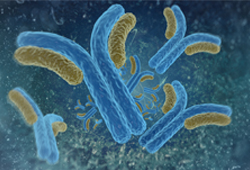 On September 30, 2025, the U.S. District Court for the Northern District of California ordered Biogen MA, Inc. (“Biogen”) to pay Genentech, Inc. (“Genentech”) $88,348,123 in unpaid royalties plus interest. The parties stipulated to $35,903,701 in interest on October 3.
On September 30, 2025, the U.S. District Court for the Northern District of California ordered Biogen MA, Inc. (“Biogen”) to pay Genentech, Inc. (“Genentech”) $88,348,123 in unpaid royalties plus interest. The parties stipulated to $35,903,701 in interest on October 3.
As we reported previously, in 2004, Genentech granted a non-exclusive license enabling Biogen to use an antibody manufacturing process covered by two Genentech patents, US. Patent Nos. 6,331,415 and 7,923,221 (the Cabilly Patents), for natalizumab, the active ingredient in Tysabri, which is indicated for multiple sclerosis and Crohn’s disease. The Cabilly patents expired on December 18, 2018. On February 28, 2023, Genentech filed a lawsuit against Biogen seeking payment of royalties for certain post-patent expiration sales of Tysabri, which Genentech termed “tail” royalties.
The case, Genentech, Inc. v. Biogen MA, Inc., No. 2:23-cv-909, was tried before a jury, which was unable to reach a unanimous verdict. Following the declaration of a mistrial on July 3, 2025, the parties submitted the case for resolution by the Court under Federal Rule of Civil Procedure 52. The parties also stipulated to the royalty amount, if owed, minus interest.
The Court evaluated the terms the parties contended were controlling and found that the Biogen-Genentech Agreement was “reasonably susceptible” to each party’s proposed interpretation, such that extrinsic evidence would be admissible under California state law to assist in interpreting the agreement. The Court assessed the negotiation history and post-agreement conduct, including Biogen’s conduct with respect to other license agreements, and concluded that Biogen itself understood the Biogen-Genentech Agreement to require payment of tail royalties for the relevant sales of Tysabri.
